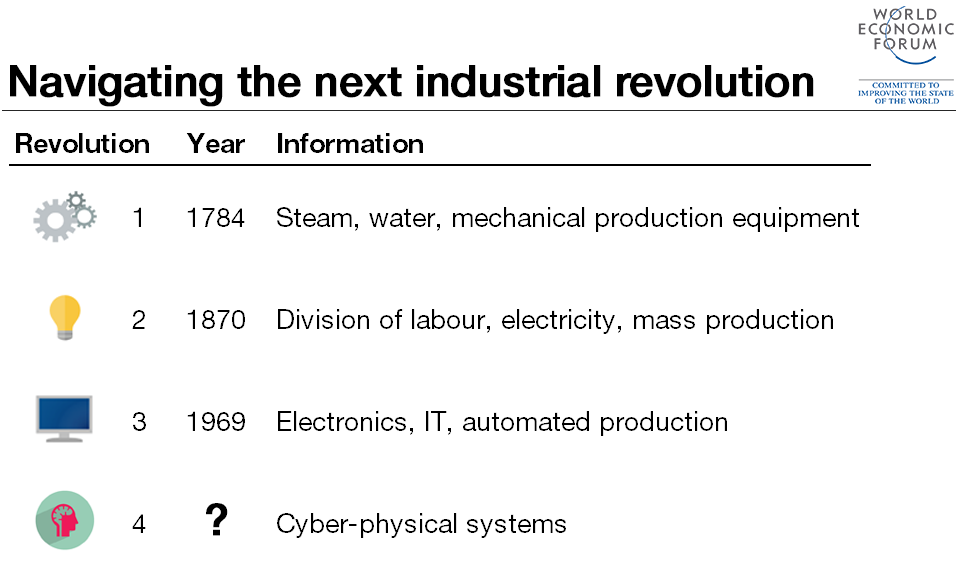Why the Fourth Industrial Revolution needs to be global

Stay up to date:
Fourth Industrial Revolution
Professor Klaus Schwab, Founder and Executive Chairman of the World Economic Forum, recently – and correctly – pointed out that, “if managed well”, the unfolding Fourth Industrial Revolution can bring about a cultural renaissance that is truly global, and could lead to a more inclusive, sustainable and harmonious society.
“But it will not come easily,” Schwab warns. To achieve these goals, today’s leaders need to move beyond a western-focused view, looking not only at what societies in the Western world need in a sustainable development context, but also the rest of the world.
It is more than 130 years since Thomas Edison created the first commercial electric lamp. It is important to remember that worldwide, today, 1.3 billion people – almost one fifth of the world’s total population have not even seen the light of the second industrial revolution. Nearly 97% of those without access to electricity live in sub-Saharan Africa and developing Asia.
We should also not shrug off the fact that western industrial countries have emitted millions of tonnes of greenhouse gases into the ecosystem. Human-induced climate change, unfortunately, will hit non-western, poor countries the hardest over the next century. These nations are likely to experience gradual sea-level rises, stronger cyclones, unpredictable rainfall patterns, and larger and longer heatwaves, according to the Intergovernmental Panel on Climate Change.
And while residents of wealthy nations make use of an increasing number of gadgets, the e-waste from these products is routinely dumped by developed countries into India, Africa and China. Greenpeace estimates that in Europe and the US over 50% of waste collected for recycling is exported in this way.
There is no doubt that the previous three industrial revolutions have brought enormous wealth and high living standards to millions of people.
For the Fourth Industrial Revolution, however, needs to be different.
It should not merely be about speed, productivity or entertainment in the wake of the Internet of Things (IoT), smart factories and Cyber Physical Systems. It should drive home the importance of seeking solutions to heal our world, a world in which there are many divisions between man, the state, and nature.
One simple way is to align the Fourth Industrial Revolution with the Sustainable Development Goals (SDGs), the 17 goals adopted by all 193 United Nations members this year in New York which are to be achieved by 2030.
For example, developed countries should fulfill their 45-year-old UN commitment to set aside 0.7% of their respective Gross National Incomes (GNI) as Official Development Aid (ODA). Among the G7 countries, only the UK meets this target. Germany, Europe’s biggest economy, spends 0.38% of its GNI on aid, and the US, with 0.18%m spends even less, according to the 2013 number published by the Organization for Economic Co-operation and Development (OECD).
The SDG document adopted by world leaders in September 2015 states that developed countries “reaffirm … to achieve the target of 0.7% of ODA/GNI to developing countries and 0.15% to 0.2% of ODA/GNI to least developed countries.”
I would suggest that governments and businesses in developed countries divert some of their financial capital to helping the 1.3 billion people who still live without electricity, and to help the poorer countries who have been hit hardest by our changing climate.
The Fourth Industrial Revolution should not merely focus on frontline inventions that affect the developed world, but also place an emphasis on developing innovative technologies which meet the bottom-line needs of poorer countries, such as affordable vaccines, clean drinking water, sustainable energy and solutions to hunger.
Using Professor Schwab’s words, the Fourth Industrial Revolution should have “a human heart”, one which meets the needs of all us, wherever we are.
Author: Shuaihua Cheng, Shuaihua Cheng is a Group Manager of the E15 Expert Group on Industrial Policy. He is Senior Programme Officer for Asia Pacific and China at ICTSD, Managing Director of ICTSD’s China Office, and a Yale World Fellow 2015.
Image: Ingo Blechschmidt, head of Nagra’s Grimsel Test Site (GTS), checks the Colloid Formation and Migration (CFM) experiment, which investigates the influence of colloids on the mobility of radionuclides through fractures and shear zones in the rock, at the GTS on the Grimsel Pass in the Swiss Canton of Bern July 2, 2012. REUTERS/Arnd Wiegmann
Don't miss any update on this topic
Create a free account and access your personalized content collection with our latest publications and analyses.
License and Republishing
World Economic Forum articles may be republished in accordance with the Creative Commons Attribution-NonCommercial-NoDerivatives 4.0 International Public License, and in accordance with our Terms of Use.
The views expressed in this article are those of the author alone and not the World Economic Forum.
Forum Stories newsletter
Bringing you weekly curated insights and analysis on the global issues that matter.
More on Fourth Industrial RevolutionSee all
Gustavo Maia
April 22, 2025
Cathy Hackl
April 21, 2025
Aimée Dushime
April 18, 2025
Zara Ingilizian and Oliver Wright
April 18, 2025
Dylan Reim and Judith Vega
April 17, 2025





